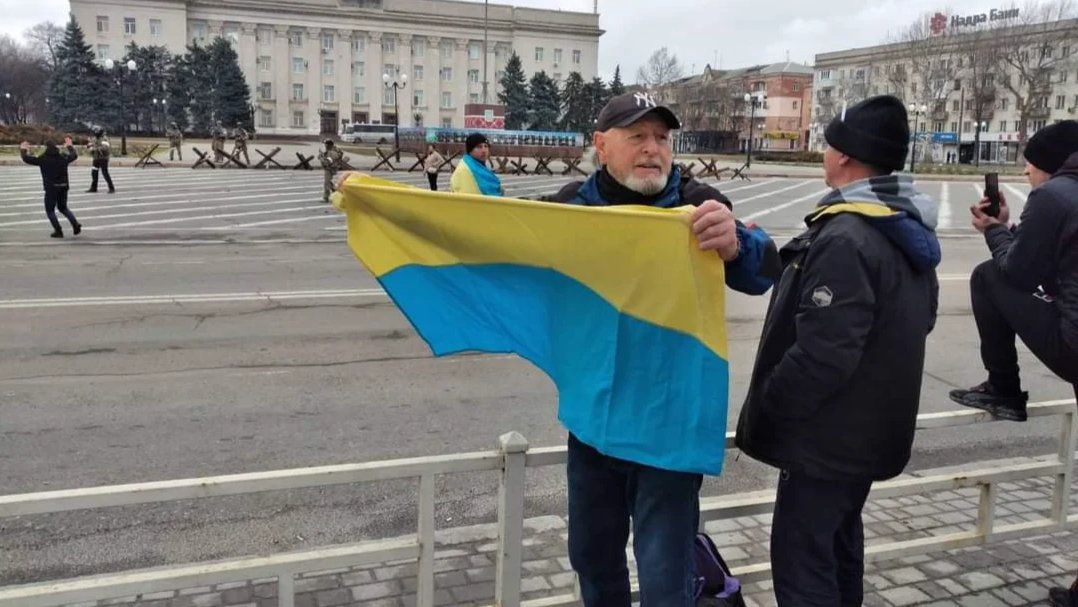A 75-year-old Spanish volunteer who was abducted in the Ukrainian city of Kherson last year has now been held by the Russian authorities in annexed Crimea for a year and a half without charge, where he’s reportedly been subject to appalling conditions, regular beatings and torture.
On 19 March 2022, Mariano García Calatayud, a 75-year-old Spaniard living in Ukraine, rang the buzzer to his own apartment in the city of Kherson to let his partner Tetyana Marina know that he had returned. By the time Marina had gone downstairs to let him in, however, García had disappeared without trace.
That day he had been returning home after attending a protest against the Russian occupation of the city. “We already knew that the Russians were kidnapping people who spoke out against the occupation,” Marina says. “I realised straight away that he had been detained.”
Neither she nor her family have seen García since. It took over a year for the Russian authorities just to confirm that García was being held in Simferopol, the capital of annexed Crimea. This was being done, they said, to “verify reports” that he had been involved in activities “aimed at undermining Russia’s security”.
Garcia is yet to be charged with a crime. His lawyer, Anatoly Fursov, believes this may be due to the Kremlin’s interest in his client’s potential use as a bargaining chip in any potential prisoner swap with the West.
‘Basic acts of kindness’
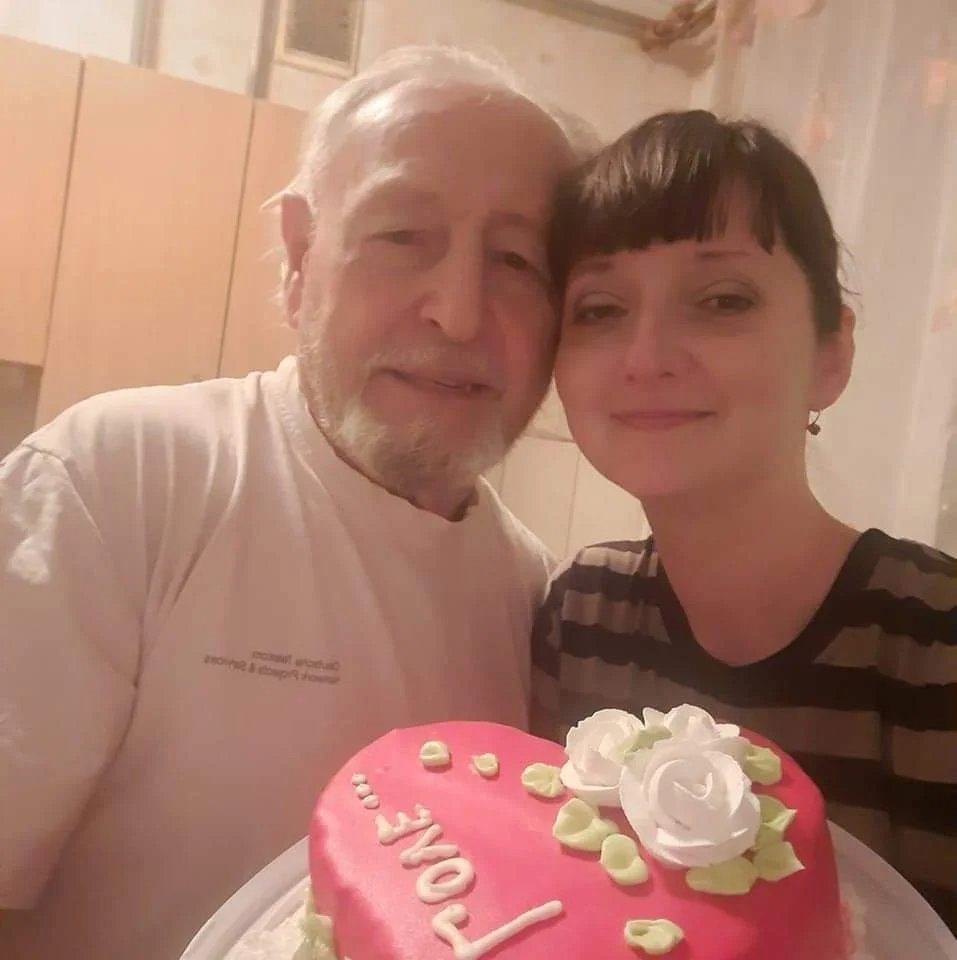
Mariano García Calatayud with partner, Tetyana Marina. Photo from private archive
Prior to 2014, Mariano García Calatayud, known as Mario, has been an unremarkable local official in the Spanish province of Valencia, earning a decent salary and living in a large house with a pool. However, his life altered dramatically when he was put in charge of collecting humanitarian aid for Ukraine following the Russian annexation of Crimea and the war in the east of the country. While on a visit to Kyiv for work, García decided to stay on to ensure the aid being provided was distributed more smoothly. He eventually took early retirement from his job and moved to Kherson to devote himself full-time to his new role.
“Mario is a proper passionate Spaniard. He was deeply touched by events in Ukraine,” Marina says, recalling that they brought back memories of Spain’s own experience under Franco. “He couldn’t stay away when war broke out,” she added, saying he wanted to be “useful” and had even “taken several orphanages under his wing”.
His lawyer, Anatoly Fursov, adds, “García’s father told him when he was young that Ukrainians had helped the Spanish during World War II. This is what inspired him to move here and help the country.”
As well as distributing humanitarian aid during his time in Ukraine, García engaged in what Fursov refers to as “basic acts of kindness,” such as teaching children Spanish.
Living under occupation
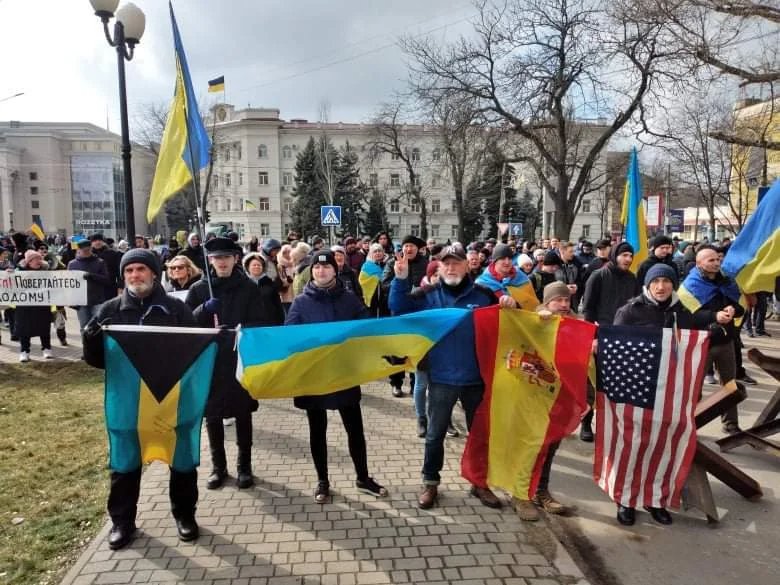
García at a rally against the Russian occupation. Photo from private archive
García had already made a reputation for himself in Kherson when Russian forces rolled in on 2 March as he had given interviews to various international media outlets since the Russian invasion began in which he never failed to make his pro-Ukrainian sentiments clear.
He and Marina were quick to join the public protests against the occupation. Such demonstrations were initially tolerated, before the Russians cracked down on such public displays of dissent. On the day of García’s abduction, he had asked Marina to stay at home precisely due to his concerns for her safety.
Marina recalls the terror that gripped Kherson at the time, saying that “people weren’t being shot but they were often kidnapped in broad daylight”. Understanding what might happen, she pleaded with García to leave Ukraine, but he replied bluntly that he was going nowhere.
Marina immediately began her attempts to locate and bring her partner home as soon as he disappeared. She appealed to the collaborationist regional administration, put out calls for information on social media, and spoke to journalists and bloggers at protests, all to no avail.
Torture and intimidation
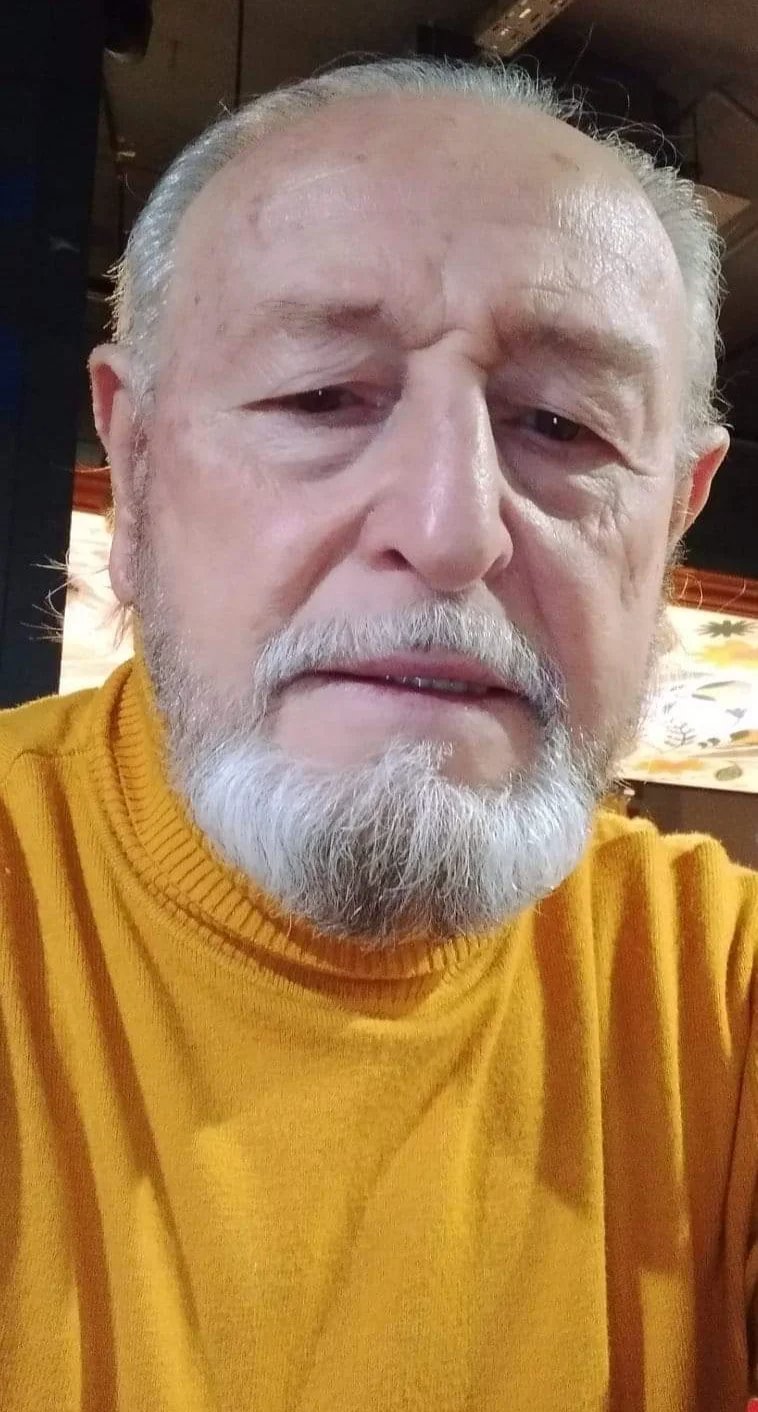
García Calatayud. Photo from private archive
While Marina continued her desperate search, García was being held in a local detention centre alongside dozens of other locals who had been outspoken critics of the Russian invasion. There, García met Yevhen Babiichuk, a 28-year-old from Kherson who has since been released. Babiichuk recalls that despite only speaking Spanish and English, García remained defiant towards his captors and would always speak his mind about Russian President Vladimir Putin and the occupation, all the while peppering his comments with obscenities.
In late March, the prisoners were piled into a van and taken to the Federal Security Service (FSB) headquarters in Simferopol. Babiichuk describes the conditions of their journey as “unbearable” and says that upon arrival in Crimea all the prisoners were beaten up. He adds that Russian officers employed a wide arsenal of physical punishments to intimidate prisoners, including beatings and electrocution.
Despite his age, García was targeted more than others as he couldn’t understand the instructions he was given in Russian.
Oleksandr Tarasov, a blogger and activist from Kherson who was also imprisoned in Crimea, confirmed that García was regularly tortured. “Mario had a very hard time. He doesn’t speak the language, he is in his seventies and has ongoing health issues. He kept asking for a doctor but they usually ignored him,” he says. “Mario didn’t understand the guards’ instructions and was constantly tasered as a result.”
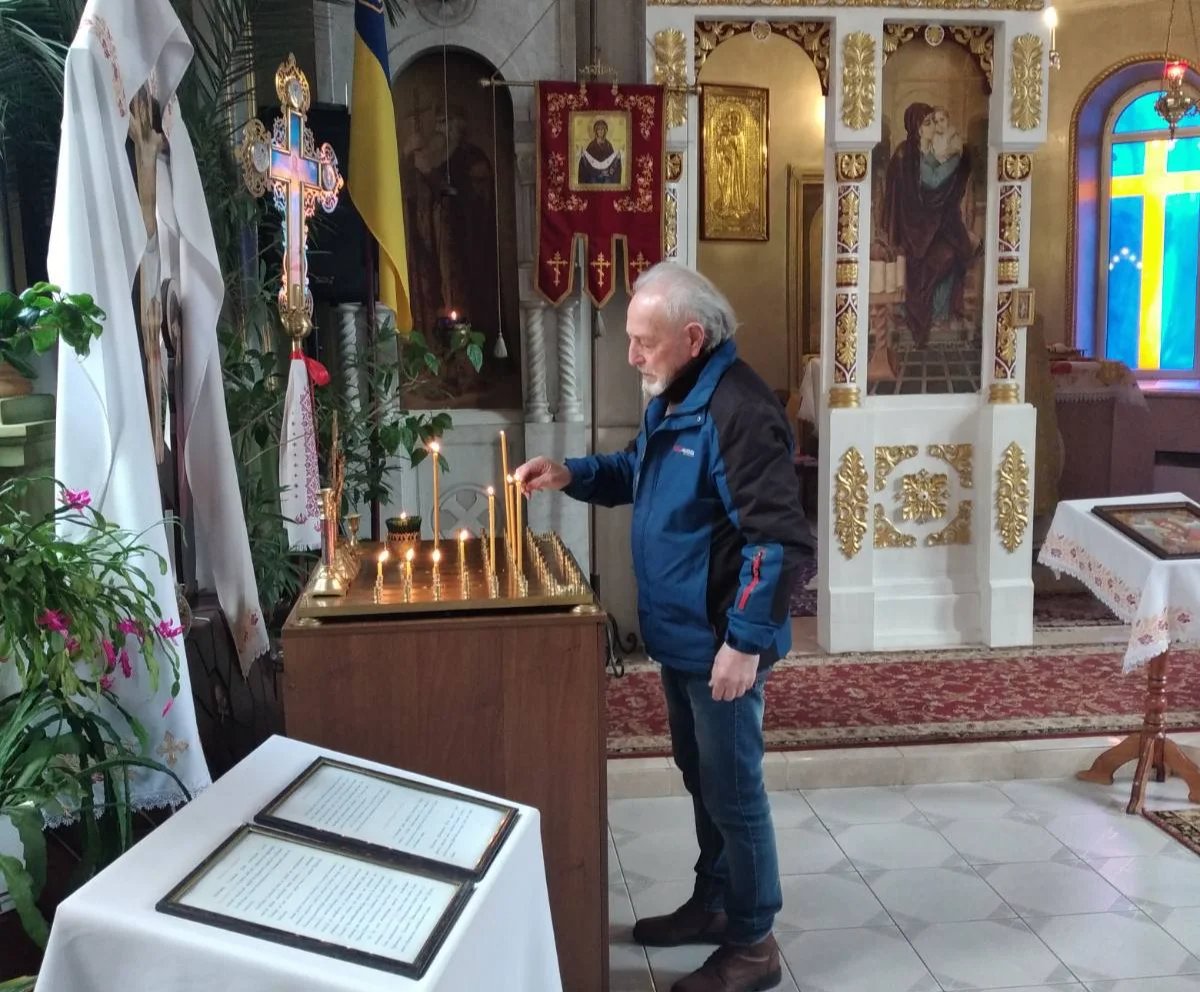
García Calatayud in church. Photo from private archive
Babiichuk says the interrogations they were subjected to were designed to “break people psychologically,” and says that prisoners were routinely threatened with “weapons and rape”. Russian law enforcement officers “deliberately lay traps to beat people up”, Babiichuk continued, adding: “They are Russian. They don’t know the meaning of the word ‘rights’”.
García’s cellmates say that he was interrogated several times without an interpreter present. His lawyer corroborates this, saying: “Mario was interrogated without lawyers or a translator. No-one knows what they asked him and what he was forced to sign.”
‘He’ll survive’
Marina was eventually able to discover that her partner had been seen in Simferopol in early April 2022, though she had no concrete proof. Her friends spoke to an FSB officer in Kherson who told them García’s body had been thrown into the river. “If you want to find him, get divers to look at the bottom of the Dnipro,” the officer chuckled, refusing to answer any more questions.
Despite her distress, Marina never gave up hope and continued searching. In late August 2022, she heard of someone who had been held in the same cell as García. “When I heard this news, it felt like I was reborn. It’s horrible living with the thought that someone has been drowned in a river over nothing,” she recalls.
García’s health has deteriorated dramatically during his months in detention. Fursov says his client even had a heart attack in his cell.
Despite being prescribed several medications for his heart, the 75-year-old received no such care since being transferred to Crimea.
“Mario was at death’s door. His cellmates were crying out for help but the guard shrugged it off, saying he’d survive. The prison authorities only sent him to hospital once he’d turned blue,” his lawyer says.
Babiichuk and Tarasov maintain that other prisoners are having an even harder time in Crimean detention. On 9 May, Victory Day in Russia, special forces stormed into their cell shouting, “You are all fascists!” and tasering the prisoners, Tarasov says. “The things they say during interrogations are beyond comprehension. They are fanatics. They want a nuclear war and still believe that Russia embodies certain spiritual values. It’s total nonsense.”
“There have been many reports of mock executions. People are interrogated for hours and then an FSB officer loads a gun and says, ‘This is it. These are your final moments,’ and fires. It’s a blank but you can imagine how people feel after that,” Fursov says, adding that some detainees were tortured until they agreed to act as informants and sign statements incriminating Ukrainian activists to ensure lengthy prison terms.
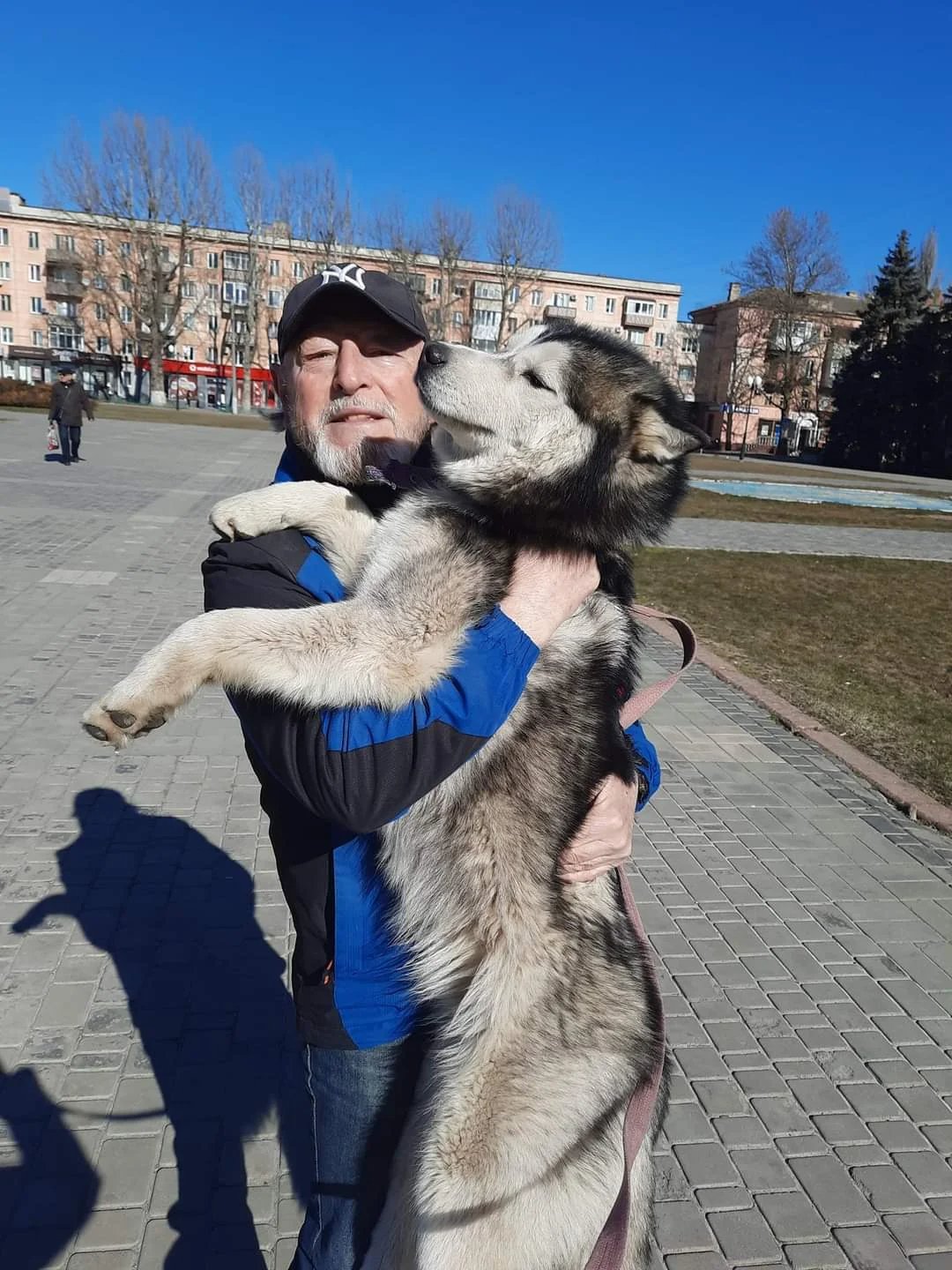
García with his favourite dog. Photo from private archive
Human bargaining chip
Spain responded to the news of García’s detention by launching a criminal case and interviewing his lawyer Anatoly Fursov, Tetyana Marina and several former prisoners of the Crimean FSB among others. However, even García’s lawyers were only able to get official confirmation of his whereabouts a year after his abduction.
In April, the Russian military prosecutor confirmed in a letter that García was indeed in custody as part of a probe into his involvement in “actions aimed at harming Russia”. The prosecutor declined to divulge any further details about the investigation, which was described as “ongoing”, on the grounds that it was classified.
“Russia continues to demonstrate to the whole world that it is lawless. We have three lawyers working in Crimea who have been told by the FSB that Russia is currently at war with NATO, making García a citizen of an enemy state, meaning no laws apply in this situation,” Fursov says.
“We learnt that after his case had become news, the FSB told doctors to keep a close eye on his health and the head of the ward was warned that his neck was on the line if anything happened to the Spaniard,” Fursov continued, adding that the Russian commissioner for human rights refused to meet with one of García’s lawyers to discuss the situation.
Several months ago, his lawyers did manage to speak with military prosecutors. They were told the FSB was holding onto García for a potential swap should a Russian spy ever be detained in Spain.
“There are a large number of Russian spies operating in Spain. The FSB is waiting for when one of them gets arrested and they’ll have the upper hand with the 75-year-old retiree,” Fursov says, recalling the conversation. “We understand that the secret services want to keep him healthy. He is a valuable bargaining chip. No one wants him dead.”
Join us in rebuilding Novaya Gazeta Europe
The Russian government has banned independent media. We were forced to leave our country in order to keep doing our job, telling our readers about what is going on Russia, Ukraine and Europe.
We will continue fighting against warfare and dictatorship. We believe that freedom of speech is the most efficient antidote against tyranny. Support us financially to help us fight for peace and freedom.
By clicking the Support button, you agree to the processing of your personal data.
To cancel a regular donation, please write to [email protected]
